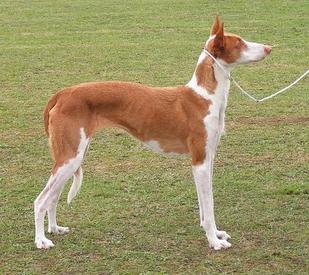
The Ibizan Hound originates from...
Thought to have originated on the island of Eivissa when the Phoenicians founded settlements there in the 8th century, the Ibizan is believed to have a much older lineage, with depictions of the modern breed appearing in Ancient Egypt from around 3,400 BC. Further speculation suggests that the true heritage of the Ibizan Hound began in 700 BC when sea traders brought these dogs to Ibiza from areas of France and Spain and were traditionally used to hunt rabbit. Sometimes called the 'Podenco Ibicenco,' the breed is often likened to the Pharaoh Hound, Portugese Podengo, and Cirneco dell'Etna. It was officially recognised by the American Kennel Club in 1978.
The Ibizan Hound is characterised by...
In appearance and structure, the Ibizan bears a resemblance to the Greyhound, boasting a lean and athletic form, straight legs, small eyes, high-set ears, and a narrow tail. Bigger than the Pharaoh Hound, the Ibizan is distinctive and graceful, coming in two varieties — the Smooth and Wire-Coated. Common colouring includes red and white, solid red, or white and tan. Due to its early usage as a rabbit hunter, the Ibizan Hound should be gradually introduced to other house pets from an early age, especially if the pets are smaller than itself.
The average Ibizan Hound...
Requiring a great deal of exercise and mental enrichment, the breed is best suited to an active family or dedicated sole owner. Meek and mannered by nature, the Ibizan Hound adapts well to new situations and people, although will often display a certain shyness around strangers until it has familiarised itself with them. Compatible with children and devoted to its family, it makes a great addition to active domestic life, providing its needs for exercise and companionship are met. A healthy, fully grown Ibizan Hound will weigh 19-25kg on average, with a life expectancy of 10-12 years when shown the appropriate love and care.
Weaknesses...
Typically healthy and resilient, the Ibizan is not susceptible to many genetic diseases. Allergies are commonly identified in the breed, as are seizures, and the disease Axonal Dystrophy, affecting nerves and muscles, is frequently seen.
Browse more breed facts and information or take a look at our range of joint care, supplements, and dental products.
Do you own a Ibizan Hound? Let others know what they're like!
Related products
Advantage 80 Spot On Flea Control Large Cats and Rabbits
from £12.95
Advantage 40 Spot On Flea Control Cats, Small Dogs and Rabbits
from £12.95
Advantage 100 Spot On Flea Control Medium Dog
from £12.95
Advantage 250 Spot On Flea Control Large Dog
from £12.95
Drontal Tasty Bone Wormer Tablets for Small & Medium Dogs (2 to 20kg)
from £2.15
FRONTLINE Plus Flea & Tick Treatment Dogs & Cats
from £17.49
TermaWorm™ Tablets for Cats & Dogs
from £1.59
Drontal Tasty Bone XL Wormer Tablets for Large Dogs (Over 20kg)
from £6.39